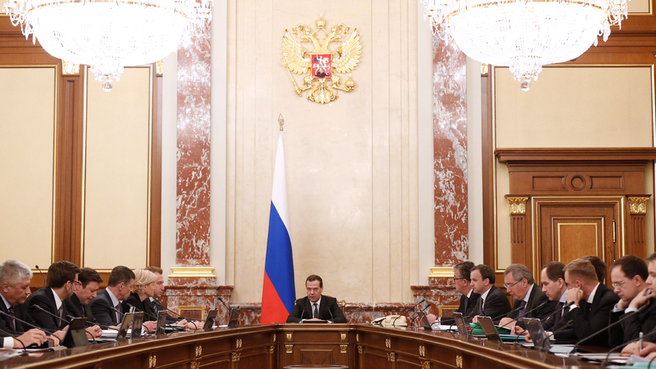Accumulative pensions and the socio-economic development forecast for 2016-2018.
Excerpts from Dmitry Medvedev’s opening remarks:
An issue that sparked fairly heated debates both in the Government and among the experts concerns the future of the accumulative element of pensions. We have taken a decision – we will keep the accumulative element. This decision is supported by the majority of experts and, most importantly, by the people. We must develop a predictable pension system, improve it and optimise a number of pension mechanisms.
That said, I entrust the Finance Ministry and the Economic Development Ministry to submit proposals on how to balance the budget in line with the adopted decision and to work out proposals on how to use the financial resources of the accumulative pension system more effectively as a source of economic growth in our country, keeping in mind that it can also be used to support investments and boost the economy, especially in a situation where foreign financial liquidity markets are shut for us.
We need to clarify the forecast estimates for our basic macroeconomic parameters and use them to draft a federal budget for the coming three years and make forecasts of the external economic situation and our economic growth rates.
A list of key priorities of the Government’s work in 2016-2018 has been drawn up and is open for discussion. The forecast should take account of all major restrictions that our economy was confronted by in recent time. These are, in the first place, a drop in investments, including from private business, the continuing capital outflow and the all but simple situation on global raw materials markets and financial markets. This being the case, it is presumed that the gross domestic product in real terms is likely to decrease in the current year – by around 2.8 percent. Nevertheless, we expect economic growth to start to recover towards the end of the year – to reach more than two percent in 2016, according to the baseline scenario, and in comparable figures in 2017-2018.
Any possible scenario must envisage measures to support the most vulnerable social groups, keep the labour market stable and continue to upgrade the housing and utilities sector, and, of course, set forth steps aimed at curbing inflation and restoring growth of the real incomes of the population.
We will also review a bill designed to create favourable conditions for start-up ventures. To this end, we would ease the tax burden. The case in point is a profit tax for industrial start-ups. The regions would be allowed to reduce the rate to 10 percent for the tax that goes to the regional budget. The rate for the tax that goes to the federal budget would be slashed to zero.












